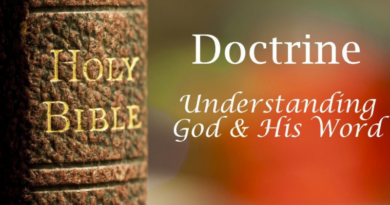BIBLE DOCTRINE 7: JUSTIFICATION
God’s Word teaches:
That Justification (or regeneration) is the act of God’s grace whereby one receives forgiveness and remission of sins and is counted righteous before God, through faith in the atoning blood of Jesus, standing before God as though he had never sinned – Psalm 32:1,2; Isaiah 1:18; Micah 7:19; John 3:3-8; Acts 13:38,39; Romans 3:24-30; 4:6-16; 5:1,2; 2 Corinthians 5:17-21; Galatians 2:16; Acts 2:38; 8:8,9; Titus 3:5; 1 Peter 1:23.
Justification is the act of God’s grace through which one receives forgiveness and remission of sins and is counted righteous before God, through faith in the atoning blood of Jesus. Having thus been cleared of every guilt of sin, the regenerated stands before God as though he had never sinned. Now totally forgiven and the sins forgotten, God looks at the redeemed sinless not on the basis of any personal merit but in the light of what Christ had accomplished for mankind by His substitutionary death on the
cross of Calvary (Psalm 32:1,2; Isaiah 1:18; Micah 7:19; Acts 13:38).
In order to fully appreciate the benefits of salvation in Christ Jesus, the utter helplessness and hopelessness of man should be noted. Man being incapable of personally providing a solution to his problem of sin or change his eternal destiny of damnation (Isaiah 59:8), the need for justification becomes obvious.
To meet the standard of divine justice due price needed to be paid. Man lacked both the capacity and the purity to afford this. It therefore required the sacrifice of the spotless Lamb of God, untainted and without blemish in Himself to pay the necessary ransom with His blood for the expiation of man’s sins. It is instructive here to note that the nature of sin is not such that man could handle on his own or by the merit of his good works (Ephesians 2:8,9). Just as circumcision cannot justify the Jew nor water baptism the Gentile, so by the standards of God’s righteousness and holiness, church membership or confirmation does not suffice to justify any one. Only faith in the atoning work of Jesus Christ on the cross can assure a penitent soul the full justification by the grace of Jesus. As has been outlined above, three aspects of the doctrinal question need be examined closely: Redemption by the blood of Christ, Necessity of Faith, and the Evidence of Justification. Genesis 2:16,17 reads: “And the LORD God commanded the man, saying of every tree of the garden thou mayest freely eat: but of the tree of the knowledge of good and evil, thou shall not eat of it: for in the day that thou eatest thereof, thou shalt surely die.” God’s indelible words as revealed in the Holy Scriptures cannot be changed (Isaiah 55:11). “Heaven and earth shall pass away, but my words shall not pass away (Matthew 24:25).
Adam and Eve, though still physically present in the garden of Eden after eating the forbidden fruit, were consequently spiritually dead and became alienated from God and from the commonwealth of His kingdom. This verdict they could not set aside, which emphasizes the insufficiency of man’s works and personal endeavour in gaining salvation, except by being born again (John 3:3). It needed a Messiah – one qualified and of a high integrity to meet the divine standard and thus satisfy God’s imperative judgment.
Christ therefore became the sin-bearer, based on the fact of God’s provision and what the Scripture says (Romans 3:25). “And He is the propitiation for our sins; and not for ours only, but also for the sins of the whole world” (1 John 2:2; Acts 4:12). And by Christ’s finished work of grace, solution was provided to the problem of sin to ensure man’s reconciliation with God (Isaiah 44:22; Romans 5:9). Although Christ’s atonement on the cross guarantees universal provision of salvation or all mankind, this
could only be appropriated on a personal basis through faith in Christ Jesus. The sinner who seeks salvation must take the necessary step of faith in the blood of Jesus. Paul gives proof of this in his Epistle to the Romans 5:1 – “Therefore being justified by faith, we have peace with God through our Lord Jesus Christ”. “For unto us was the gospel preached, as well as unto them: but the word preached did not profit them, not being mixed with faith in them that heard it” (Hebrews 4:2; 11:6). Having been saved through faith in our Lord Jesus, the redeemed has evidence in his new life to show for his justification (2 Corinthians 5:17). In keeping with this expectation, apostle Paul exhorts the Ephesian converts: “Be ye therefore followers of God as dear children. And work in love as Christ also hath loved us, and hath given himself for us an offering and a sacrifice to God for a sweet smelling savour” (Ephesians 5:1,2).
Before he was justified, the sinner had works of the flesh as catalogued in Galatians 5:19-21, but as a new creature, the fruit of the Spirit become manifest (Galatians 5:22,23). Therefore, in lifestyle, speech, conduct, and disposition, the redeemed is more like Christ, having been quickened by the Spirit of God. The misleading concept of justification by works, as an article of man’s religion, is opposed to justification by faith because it denies the grace of God and dishonours the blood of Christ. The reference in James 2:14-26 may be interpreted amiss by a cursory reader of the scriptures, where it asks: “But wilt thou know O vain man, that faith without works is dead?” The underlying point being stressed by James is that works as referred to in this context are complementary to justification by faith. So then, though in one sense a man is justified by faith without works, in another sense we see “how by works a man is justified, and not by faith only”. Justification by faith before God; justification by works before men. Properly understood, none really is mutually exclusive.
1. Admit that you are a sinner. "For all [humans] have sinned, and comes short of the glory of God....[and] the wages of sin is death; but the gift of God is eternal life through Jesus Christ our Lord" (Romans 3:23)
2. Repent now. "Repent ye therefore, and be converted, that your sins may be blotted out ...[for] if we confess our sins, he is faithful and just to forgive us our sins, and to cleanse us from all unrighteousness " (Acts 3:19, 1 John 1:9)
3. Believe that God loves you and Jesus died for you. "God commendeth his love toward us, in that, while we were yet Sinners, Christ died for us" (Romans 5:8)
4. Invite Jesus into your life through prayer of faith. Jesus says, "Behold, I stand at the door, and knock: if any man hear my voice, and open the door, I will come in to him, and will sup with him, and he with me" (Revelation 3:20)


